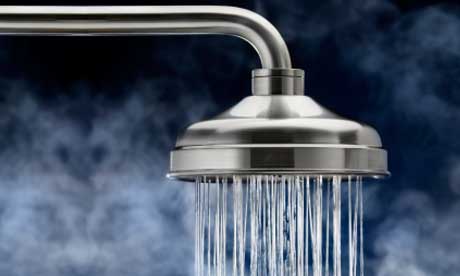Does hard water cause dry skin? The answer is absolutely yes! Hard water not only causes dry skin, but it can also wreak havoc on your hair. Thankfully, there are ways you can avoid this issue, so we’ve come up with 7 effective dry skin fixes if you have hard water. But before we get into that, what exactly does hard water mean?

Hard water contains more than 50mg/liters of calcium, magnesium, and other mineral deposits. Because of this, it can clog the pipes in your home. If it can clog your pipes, imagine what it does to your skin and hair! If you’re unsure whether or not you have hard water, we’ll tell you how you can test that!
How to Know if You Have Hard Water
It’s actually pretty easy to figure out if you have hard water! Take a clear bottle and fill it with about 350ml of water from your tap. Add about 10-12 drops of liquid soap (the kind you use to wash your hands). Close the bottle, and shake well. If there are very few bubbles, the water is hard. If you’re still not sure, add even more drops of hand soap and shake again. If there still isn’t an increase in bubbles, or if the water is cloudy, you most likely have hard water.
How Hard Water Affects Your Skin and Hair
Because hard water contains several minerals, it will leave a buildup of soap residue. This, unfortunately, can clog skin pores, and also strip away the skin and hair’s natural moisture. Clogged pores lead to breakouts, while moisture loss leads to dryness and premature aging. Additionally, hard water can also cause dry cuticles, so if you’re wondering why your nails are looking brittle and breaking, hard water may be the cause.
The minerals contained in hard water are bad for skin, hair, and nails. Over time, these minerals can dry out the skin which can cause severe breakouts, flaky skin, and even eczema. When moisture is not present in the skin, it can make you look older and bring on premature aging. For hair, hard water can make it look and feel very dry, brittle, and dull.
The Effects of Hard Water on Your Skin
In the long term, using hard water on your skin and hair can form free radicals. Over time, these break down collagen, which helps to keep the skin firm. In the short term, using hard water can cause dry, itchy, and flaky skin, as well as dry, brittle, and lackluster hair.
How to Protect Skin From Hard Water
So now that we know that hard water can cause dry skin and hair, what can we do to protect the skin? Thankfully, there are a few different things you can do.
- The best and easiest solution is to use a water softener which will make the soap easier to rinse off. This will prevent soap buildup.
- When washing your face, use a soap free cleanser to avoid buildup.
- Try not spending too much time in the shower and avoid very cold water and very hot water.
- When washing your face, try using alternative methods such as coconut water or rosewater. Both of these are amazing for the skin and so easy to use.
- Alternatively, you can also use distilled water or just plain milk to wash your face.
- When drying off, simply tamp down onto skin, and never rub.
- Apply lotion when skin is still somewhat damp. This will trap the natural moisture and prevent skin from drying out further.
- If you have dry skin, avoid using cleansers and body washes that contain fragrances.
How to Protect Hair From Hard Water
- Spend as little time in the shower as possible. While this may not always be ideal, it can help reduce damage to the hair folicles.
- Rinse your hair with distilled water, almond milk, regular milk, or coconut water. These will impart moisture.
- Use a weekly moisturizing hair mask. Choose a homemade mask that contains lots of fat, such as masks with avocado, oils, and mayonnaise.
- When drying the hair, don’t rub your towel, but rather just tamp down. Rubbing a towel on your hair can cause breakage and frizz.
- Limit the use of heating tools such as hair dryers, flat irons, and curling irons. If you do use them, consider using a heat protectant spray.
